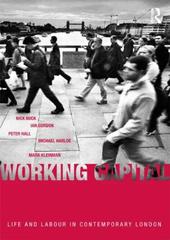
|
Working Capital: Life and Labour in Contemporary London
Paperback
Main Details
| Title |
Working Capital: Life and Labour in Contemporary London
|
| Authors and Contributors |
By (author) Nick Buck
|
|
By (author) etc.
|
|
By (author) Ian Gordon
|
|
By (author) Peter Hall
|
|
By (author) Michael Harloe
|
| Physical Properties |
| Format:Paperback | | Pages:424 | | Dimensions(mm): Height 246,Width 174 |
|
| ISBN/Barcode |
9780415279321
|
| Classifications | Dewey:307.7609421 |
|---|
| Audience | | Undergraduate | | Postgraduate, Research & Scholarly | | Professional & Vocational | |
|---|
| Illustrations |
40 maps and 10 graphs, bibliography, index
|
|
Publishing Details |
| Publisher |
Taylor & Francis Ltd
|
| Imprint |
Routledge
|
| Publication Date |
31 October 2002 |
| Publication Country |
United Kingdom
|
Description
Exactly one hundred years ago, Charles Booth published the definitive edition of Life and Labour of the People in London - the world's first urban social survey. Combining intensive statistical analysis with hundreds of interviews, his work revealed that millions of Londoners lived below the minimum poverty line. It caused a sensation that led directly to legislation creating Britain's Welfare State. Working Capital is the new 21st-century Booth survey. Written by five of Britain's leading academic urban specialists, it too is based on a mass of in-depth data analysis and hundreds of interviews across London and its wider region - with employers, teachers, students, officials, and ordinary people in their homes. It addresses questions as vital as the ones that animated Booth - but today, they are different. In recent years, big cities like London have been seen sometimes as a problem, sometimes a solution. Now, they appear to be both: hugely successful in the new global economy, but their riches unequally distributed. And this may lead to social exclusion, even polarisation, which - through poverty, crime and declining quality of life - may threaten their continued economic success. So the new political challenge is to reconcile competitiveness and cohesion, through the fine art of urban governance. Working Capital puts these three key concepts - competitiveness, cohesion, governance - under the research microscope. London is the ideal subject: hailed as the world's one truly global city, it has proved outstandingly successful, yet is marred by increasing inequality and deprivation. And, between Mrs Thatcher's abolition of the Greater London Council in 1986 and Tony Blair's creation of the new Greater London Authority in 2000, it was the laboratory for a myriad of experiments in network governance. Using the formula Booth made famous - a combination of broad, region-wide statistical analysis and interviews with real people in real places - these conclusions will be central in examination of the Mayor's new London Plan, published in June 2002, and in planning and policy-making across the London boroughs. But they will be relevant far beyond London's borders: for other UK cities, for cities on the European mainland, and indeed for cities across the world. Working Capital will be essential reading for all who care about cities. Belinda Brown, Karen O'Reilly, Gareth Potts, Laura Smethurst, Jo Sparkes
Reviews'Working Capital is an essential read for many people; indeed all involved in the developing the future of London.' - Built Environment '[An] extensive, thoroughly grounded and well-conducted study of current life and labour in London... ...Working Capital: Life and Labour in Contemporary London approaches critically some of the most-debated concepts of urban theory and policy with a strong empirical grounding and does so in an engaging and stimulating manner, relevant for practitioners, academics and students.' - Gesa Helms, Urban Studies Vol 42, April 2005
|